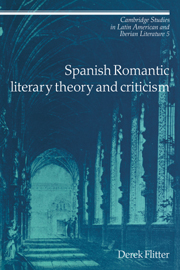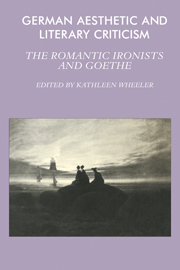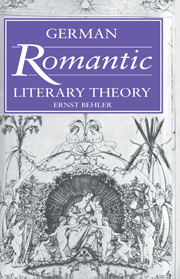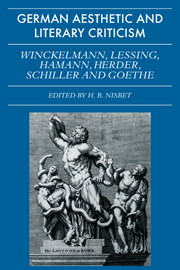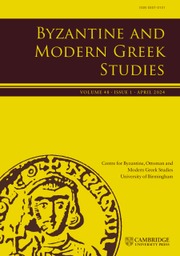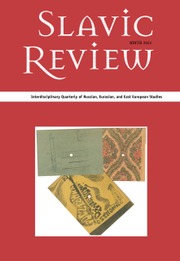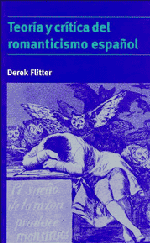Spanish Romantic Literary Theory and Criticism
Part of Cambridge Studies in Latin American and Iberian Literature
- Author: Derek Flitter, University of Birmingham
- Date Published: April 2006
- availability: Available
- format: Paperback
- isbn: 9780521025614
Paperback
Other available formats:
Hardback, eBook
Looking for an examination copy?
This title is not currently available for examination. However, if you are interested in the title for your course we can consider offering an examination copy. To register your interest please contact [email protected] providing details of the course you are teaching.
-
This study provides a fresh assessment of Spanish Romanticism through a sympathetic appraisal of its literary theory and criticism. It identifies the origins of Spanish Romantic thought in the theories of German Romantic thinkers, in particular Herder's historicism. The range of reference, from the articles of Böhl von Faber to the judgments made by Cañete and Valera is counterpointed by the detail of close readings of books and articles published between 1834 and 1844, together with an examination of the ideas that informed the creative work of Fernán Caballero. Derek Flitter's use of the history of ideas offers a corrective to the recent preponderance of political approaches to Spanish Romanticism, countering their stress on its radical and liberal associations with a detailed demonstration that the majority of Spanish Romantic writers derived their inspiration from restorative, traditionalist, and Christian elements in their contemporaries' theory and criticism.
Read more- A fresh assessment of Spanish Romanticism, revising recent political approaches to the subject
- Shows the important influence of German Romantic thought on Spain
- Relevant to the history of European Romanticism and literary theory generally
Reviews & endorsements
"...constitutes a valuable contribution to the scholarship of Spanish (Peninsular) Literary Romanticism..." Canadian Journal of Latin American and Carribean Studies
See more reviews"Spanish Romantic Literary Theory and Criticism is the most comprehensive and important study of this topic to date. The detailed summaries of and commentaries on numerous articles by nineteenth-century critics provide a treasure-house of information. Flitter's thesis of the dominance of literary theories of historicity, organicity, nationalism, and morality in Spanish criticism of the 1820s, 1830s, and 1840s is overwhelmingly established and rings true to those of us who have spent many hours perusing mid-nineteenth-century Spanish periodicals." Brian J. Dendle, Canadian Review of Hispanic Studies
Customer reviews
Not yet reviewed
Be the first to review
Review was not posted due to profanity
×Product details
- Date Published: April 2006
- format: Paperback
- isbn: 9780521025614
- length: 236 pages
- dimensions: 228 x 156 x 14 mm
- weight: 0.363kg
- availability: Available
Table of Contents
Introduction
1. Böhl von Faber and the establishment of a traditionalist Romanticism
2. The consolidation of Romantic ideas:
1820–1833
3. The exiles, liberal Romanticism and developments in criticism
4. Condemnation and clarification in the literary debate
5. Reaffirmation of Schlegelian principles in literary criticism
6. The religious spirit in literary ideas and the influence of Chateaubriand
7. The perception of literature's role in society
8. Romantic traditionalism in the work of Fernán Caballero
9. Conclusions: the mid-century
Notes
Bibliography
Index.
Sorry, this resource is locked
Please register or sign in to request access. If you are having problems accessing these resources please email [email protected]
Register Sign in» Proceed
You are now leaving the Cambridge University Press website. Your eBook purchase and download will be completed by our partner www.ebooks.com. Please see the permission section of the www.ebooks.com catalogue page for details of the print & copy limits on our eBooks.
Continue ×Are you sure you want to delete your account?
This cannot be undone.
Thank you for your feedback which will help us improve our service.
If you requested a response, we will make sure to get back to you shortly.
×
